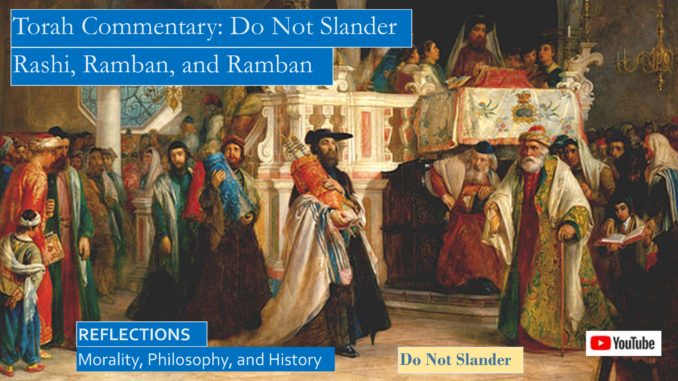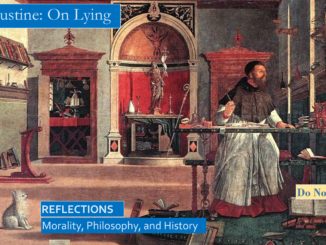
We learn that is not enough to speak truthfully of another person, but that we are commanded to speak kindly of them and guard their reputation.
A common misconception is that this Commandment only forbids us to lie. However, this Mitzvah goes deeper. Not only should we not destroy the reputation of our neighbor, we should also guard the reputation of our neighbor like we should build a parapet on our roof. Not only does this Mitzvah forbid us to lie, it also forbids us from telling the truth in a mean and heartless and cruel manner. Bitter divorcees may want to avoid talking about their former spouses to try to obey this Mitzvah, until the bitterness passes.
Negative Mitzvah 285
Do not testify as a false witness against your neighbor.
Exodus 20:13
Rashi and Rambam and Ramban do not say much about this Mitzvah, although we have Rambam quoting the Mechilta: “He who bears false witness against his fellow-man commits as grave a sin as if he had borne false witness against G_d, saying that He did not create the world.”
YouTube Video: https://youtu.be/KvKOCyREmQA
YouTube script with book links: https://www.slideshare.net/BruceStrom1/do-not-slander-teachings-from-the-medieval-rabbis-rashi-rambam-ramban-torah-and-the-talmud
Prior blogs on Do Not Envy:
http://www.seekingvirtueandwisdom.com/the-decalogue-in-the-torah-blog-5-coveting-tempts-you-to-harm-your-neighbor/
http://www.seekingvirtueandwisdom.com/the-decalogue-in-the-torah-blog-6-do-not-bear-false-witness-against-your-neighbor/
The Book of Legends teaches us, “How vicious is slander! It is more vicious than murder, unchastity, and idolatry put together.”(66) “He who speaks slander is as though he denied the existence of the Lord.”(62) “He who speaks slander so enlarges his iniquities that they reach up to heaven.”(68) The evil tongue slays thrice, it slays “the person speaking, the person spoken to, and the person spoken of.”(85)[1]
We who live in the modern world have difficulty imagining how serious a sin it was to provide false testimony. Today the police can place a criminal at the scene of a crime by combing the carpet for a single hair or a fingerprint on the furniture. We can often tell who did what to whom by analyzing small stains in clothing. But in the ancient world where science was ignorant about DNA and fingerprints, eyewitness testimony was usually the only evidence available. False testimony could destroy a person’s reputation, imprisoning them for the crimes of another. False testimony could cause the innocent to be stoned and their families to starve.
Bearing false witness murders the reputation of another. We list it as a reason for the other woman not to dance because nearly all husbands with other women are guilty of bearing false witness against their wives, and the other woman must believe them so they don’t see the lies they are living. How sad that when a third wife pops up that often wives one and two become close friends when they realize they both suffered a common fate.
Since I am a divorcee, I know how difficult it is not to speak poorly of your prior spouse. Even though when what I said was not at fault, the bitterness, anger and resentment would come through my mannerisms, my tone of voice, my very soul. I now only say kind things about her, and when I phone her I try to be as nice as I can. My goal is those closest to me will never learn her name until they meet her.
I am not suggesting that you should not talk about what ails your soul. I am speaking as a divorcee, who has been thrown out of his wife’s house and his children’s lives. My life is simple, no money, no house, no noise. I am Disney dad. The wife has her children, and her life is difficult to juggle. I often talk to mothers with children about their struggles, and I pray that when we talk over their problems they are granted peace and focus. I only pray that those little mothers will pour their hearts not to those who watch Sin in the City, but to their rabbis and those who Love Adonoy in their heart.
It is impossible to divorce a woman without breaking this Mitzvah:
Negative Mitzvah 359.
You should not divorce a woman after having falsely bringing an evil name upon her. This is derived from Deuteronomy 22:19 where it says a man should be fined “because he defamed a virgin of Israel.”
I have met few divorcees who speak well of their former spouse, so how can they not break this Mitzvah?
Rambam lists this Mitzvah:
Negative Mitzvah 251.
We should not wrong one another by speech.
The scriptural reference is:
You shall not cheat one another,
And you shall fear your G_d,
For I am Adonoy, your G_d. (Leviticus 25:17)
This verse looks like it deals with cheating rather than bearing false witness, but this does not matter. Bearing false witness is cheating the accused out of their reputation and good name. One sin turns into another with ease.
Rambam elaborates that we should not utter words that wound and humiliate, causing unbearable pain.
Not only does the Torah forbid telling lies that wound and humiliate, the Torah also forbids telling truthful things that wound and humiliate. The Torah gives us an example with Noah after he lands the ark on dry land:
Noah began to be a man of the soil
And he planted a vineyard.
He drank of the wine and was intoxicated.
He then uncovered himself in the tent.
Ham the father of Canaan saw
The nakedness of his father,
And told it to his brothers who were outside.
Shem and Japheth took the cloak,
Placed it on their shoulders,
And walked backwards,
Covering the nakedness of their father.
They faced away from him,
And did not see the nakedness of their father.
Noah awoke from his wine
And he realized what had been done to him
By his youngest son.
He said, “Cursed is Canaan.
A slave of slaves shall he be to his brothers.”
Genesis 9:20-25
Ramban teaches that the sin committed by Ham was that he did not act respectfully towards his father. Rather than being quiet and covering the nakedness of his father himself he gossiped this thing with his brothers, ridiculing his father. Sometimes when someone ridicules and embarrasses us we remember the incident all our lives, ridicule stings, as we can tell for the verse where the sons covered the nakedness of their father is repeated. The older sons did not revel in the story, rather they sought to restore their father’s dignity.
Rashi observes that the Torah follows the Mitzvah against cheating with “you shall fear your G_d” to remind us that Elohim knows the dark secrets of our heart and the evil plans in our mind.
How sad it is when there is a divorce and both spouses seek to injure the reputation of the other with their children. They are like the unrighteous judge in this Mitzvah:
Negative Mitzvah 281.
A Judge should not listen to one of the litigants in the absence of another.
This is derived from:
Do not accept a false report.
Do not join hands with a wicked man
To be a corrupt or be a false witness.
Exodus 23:1
As Rambam notes, “Slander, one of the gravest offenses, is defined as ‘talking disparagingly of anyone, even though what one says is true.’” It is not enough to be in the right, you must be right in the right way. It is better not to say anything than to speak the truth hatefully. You must not be maliciously righteous, lest your soul rot from the mold spreading in your heart.
If you are divorced, be kind to the reputation of your spouse, they can ruin it themselves quite sufficiently if they are foolish, they need no help from you. Give your spouse compliments they do not deserve and your children will remember your kindness. Be kind to your spouse and your sons and daughters will be kind to their future spouses.
There are those of us who are compelled to be judges on earth, and there are Mitzvah governing their behavior. We pray for all judges, for they are asked to judge with the wisdom of Elohim although they are crippled by the failings and limited awareness of men. We should not take to judge others, lest we be judged the many Mitzvoth, including that which is violated by all those who judge but who should not:
Negative Mitzvah 273.
You shall not commit injustice in judgment.
Leviticus 19:15
Whether you judge in your heart or by complaining to your neighbor you commit injustice because your spouse cannot defend himself. It is impossible to complain of your spouse to your neighbor and not be guilty of this mitzvah:
Negative Mitzvah 301.
Do not be a tale-bearer among your people.
Leviticus 19:16
Likewise, when you complain your side of the dispute is all that is heard, so the hearer thinks badly based solely on what you say, violating this Mitzvah against convicting on the testimony of a single witness
Negative Mitzvah 288.
One witness may not arise against a man
about any sin or for any transgression
or transgression that he transgresses;
by the word of two witnesses
or by the word of three witnesses
let a matter be established.
Leviticus 19:15
Among the Positive Mitzvah is the command to inquire into the testimony of witnesses:
Positive Mitzvah 179.
You must investigate, inquire, and interrogate (them) thoroughly.
Deuteronomy 13:15
This last passage is imbedded in a command to slay the inhabitants of city accused of following other gods only if the accusations of the accusers have been investigated thoroughly. The lesson is you just can’t believe damning testimony just because you heard it over coffee.
False testimony is so repugnant that this Mitzvah condemns witnesses who testify falsely to the same penalty as the crime they accused their brother of committing:
Positive Mitzvah 180.
You are to do to each of them
as he conspired to do to his brother,
and eliminate the evil from among you.
Deuteronomy 19:19
The following Mitzvah does not count as a reason not to dance, because it is a Mitzvah our culture breaks when it causes us to lead ungodly selfish lives:
Negative Mitzvah 299.
Against giving misleading advice, which is derived from:
You shall not curse a deaf person,
And before a blind person
You shall not place a stumbling block;
You shall fear G_d, I am Adonoy.
Leviticus 19:14
Rambam explains, “If someone asks your advice on a matter which he does not fully understand, you are forbidden to mislead him or deceive him; you must give him what you consider the right guidance.” Since this Mitzvah condemning cruel deception if followed by a reminder we should fear Elohim, we know that this Mitzvah, when violated, particularly angers Elohim.[2]
When we have hard decisions in our lives, do we ask advice from our rabbis? No, we run to the godless psychologists, and they counsel for us to do what feels good, what makes us happy. Life is hard, but when we make the easy choices, it only gets harder.
When all we want is our own happiness, when we care little about the happiness of others, when we only seek the counsel of those who want to heal us, to make us happy, will we really find real happiness? Sometimes I participate in support groups where the participants are constantly told they need to love themselves, to have more ME time, to give themselves time to heal, I wonder, what are we doing? Are they telling being told what they ought to hear, or what they want to hear? It is like these divorced people have spent their entire lives sacrificing, thinking more of themselves than others, and now they need to rest. For some this is true, particularly for women, but for others, and we do not know whom, their divorce is caused by selfishness, and we are telling them to continue with their selfishness!
This problem is deeper than most realize. In our godless culture most psychologists and counselors and most everyone disdains religion entirely. In today’s culture religion should not be discussed on weekdays. Torah is not for real problems, they teach. Because they teach that Adonoy is dead on weekdays, they deceive themselves into believing that what they give you is good advice. You too they will deceive if you are not careful, if you do not ponder the words of the Torah.
[1] The Book of Legends, Sefer H-Aggadah, translated by William Braude, (New York: Schocken Books, 1992, original 1911), Part 5, Chapter 4, “Traits and Attitudes,” pp. 696-700.
[2] For those works cited that are organized by either Mitzvah or by verses, page references are unnecessary.
All Scripture quotations are from the Metsudah Chumash.
The Metsudah Chumash/Rashi, Five Volume Set, translated and/or annotated by Avrohom Davis, Hachum Kornfeld, and Abraham Walzer, (New York, Metsuda Publications, 1999-2002),
The Torah/Chumash with Rashi’s commentary are online at www.chabad.org , search by bible verse.
Rambam Maimonides, The Commandments, translated by Rabbi C Chavel, Volume One, Positive Commandments, Volume Two, Negative Commandments (New York: The Soncino Press, 1967)
Ramban Nachmanides, Commentary on the Torah, Five Volume Set, translated and annotated by Rabbi C Chavel (New York: Shilo Publishing House, 1976)
Ronald Eisenberg, The 613 Mitzvot, A Contemporary Guide to the Commandments of Judaism (Rockville, MD: Schreiber Publishing, 2005)
Richard Elliott Friedman, Commentary on the Torah (New York: Harper Collins, 2001)




2 Trackbacks / Pingbacks